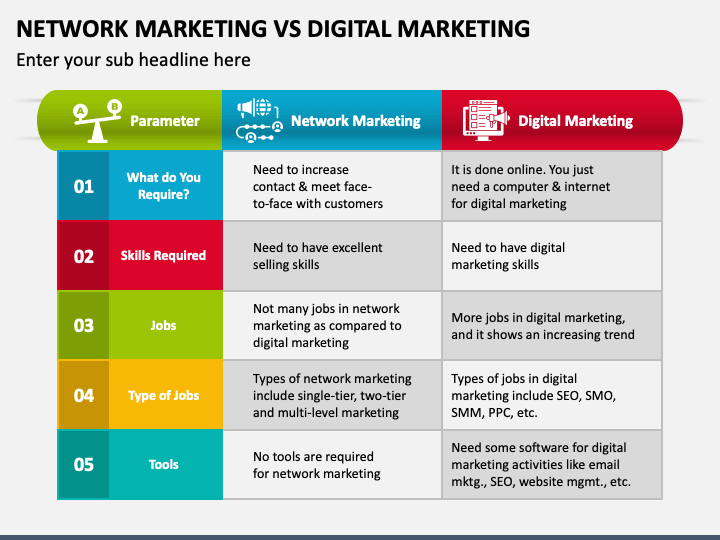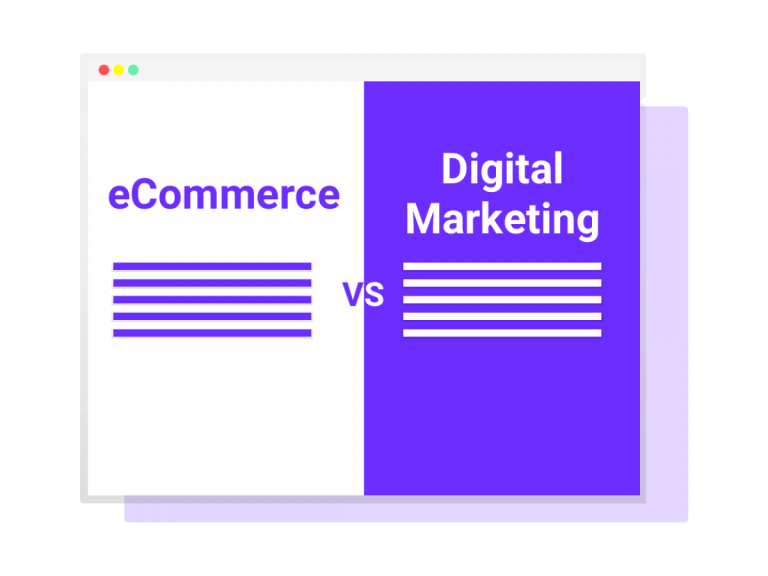Digital marketing involves promoting products or services online, while network marketing relies on person-to-person sales and building a distributor network. Digital marketing utilizes various online channels like social media, SEO, and email marketing to reach consumers directly, whereas network marketing focuses on direct sales often encouraged through existing social networks and often rewards individuals for both sales generated and for expanding a network of additional salespeople.
Understanding the distinct strategies between digital marketing and network marketing is crucial for businesses aiming to maximize their market reach. Digital marketing allows for a broad audience engagement across the internet, harnessing tools and platforms to connect with potential clients globally.
Conversely, network marketing capitalizes on personal relationships and community building to sell products and foster a team of distributors. Both methods can be significant for a company’s growth but involve different approaches to create brand awareness, reach potential customers, and drive sales, with digital marketing being more analytics-driven and network marketing relying on direct human interactions and referrals.

Credit: www.sketchbubble.com
Digital Marketing Defined
The digital world continuously shapes how we connect and conduct business. Digital marketing stands at the forefront of this evolution. It leverages the internet, mobile devices, and social media to reach consumers. Digital marketing proves essential in today’s tech-savvy environment as it allows businesses to connect with customers in real time, offering a unique blend of strategy and creativity.
Core Components
Digital marketing encompasses a multitude of strategies and tactics. Here are the main ones:
- SEO (Search Engine Optimization): Boosts online presence by ranking higher on search engines.
- Content Marketing: Engages audiences through valuable content like blog posts, videos, and ebooks.
- PPC (Pay-Per-Click): Drives traffic to websites through paid advertisements.
- Email Marketing: Communicates directly with customers through their inboxes.
- Social Media Marketing: Builds brands and interacts with customers on platforms like Facebook and Instagram.
Channels Of Distribution
These channels serve as the pathways through which the marketing message is delivered:
- Websites: The digital storefront for businesses.
- Social Media: Offers engagement and reach through community building.
- Email: Delivers personalized content directly to consumers.
- Search Engines: Connects users with relevant content based on their searches.
- Mobile Applications: Provides a platform for user-friendly experiences and notifications.
Network Marketing Basics
Understanding Network Marketing Basics is key when distinguishing it from digital marketing. Let’s break down the essentials of this unique business model and explore how it operates in today’s economy.
Fundamental Principles
Network marketing, often known as multi-level marketing (MLM), relies on a strategy where sales are not made just in traditional stores. In this model, individuals act as the brand’s ambassadors. Each member creates their own customer base and builds a network by recruiting more members. The core concept here involves earning through direct sales and a portion of the sales made by the recruited members.
- Direct Sales: Products or services are sold directly to consumers, bypassing traditional retail.
- Recruitment: Earnings increase by adding more members to the network.
- Commission Structure: Profits come from personal sales and a percentage of recruits’ sales.
Modes Of Operation
Network marketing’s operation is different from standard corporate structures. Instead of a top-down approach, it promotes a horizontal spread of financial opportunity. Success depends on personal drive and the ability to motivate one’s team. The table below shows different modes of operation in network marketing.
| Aspect | Description |
|---|---|
| Individual Sales | Sales by a network member to end consumers. |
| Team Building | Recruiting new members to expand individual networks. |
| Residual Earnings | Earnings from the sales of recruited team members. |
| Rank Advancement | Growth in hierarchy achieved via team performance. |
Converging Paths
Digital marketing and network marketing often tread different routes. Yet in this fast-evolving business landscape, their paths sometimes cross. What happens when these two distinct worlds meet? Let’s dive into how they complement each other and where the lines between them blur, in today’s marketing mix.
Complementary Strategies
Digital marketing excels in casting a wide net, reaching vast online audiences through SEO, content marketing, and more. Meanwhile, network marketing builds deep, personal connections. When combined, they forge formidable strategies:
- Brand Awareness: SEO efforts draw attention which network marketers harness.
- Personal Touch: Network marketers create trust that fuels online engagement.
- Data-Driven Insight: Digital analytics inform network marketers on customer behavior.
- Customer Reach: Online ads lead to offline conversations and conversions.
Blurred Lines In Modern Marketing
The distinction between digital and network marketing grows fainter each day. Social media bridges this gap, as network marketers use these platforms to expand their networks. Influencers in social media often use both methods:
| Digital Marketing | Network Marketing |
|---|---|
| Targets vast, diverse audiences | Focuses on individual relationships |
| Driven by content and ads | Relies on personal referrals |
| Measurable with analytics | Success measured by network growth |
| Instant online transactions | Long-term customer loyalty |
Today’s marketer often wears both hats, blending online tactics with person-to-person selling. This convergence leads to innovative strategies that can resonate on a deeper level with consumers.
Credit: www.quora.com
Divergent Tactics
In the realm of marketing, digital and network strategies take distinct paths. The main difference lies in how companies reach and interact with potential customers. Let’s explore the diverse tactics used in digital marketing and network marketing.
Communication Differences
Digital marketing relies on electronic channels. This includes emails, social media, and websites. Network marketing, on the other hand, prioritizes personal interactions. This often happens through face-to-face meetings or direct calls.
- Email campaigns versus home presentations.
- Social media ads against word-of-mouth referrals.
- Websites versus network-building events.
Audience Targeting Variations
Audience targeting differs too. Digital marketing uses data and analytics to pinpoint the ideal audience. SEO and pay-per-click ads target users based on their online behavior.
Network marketing leans on the personal network of distributors. The focus is on building relationships. Recommendations come from friends or family.
| Digital Marketing | Network Marketing |
|---|---|
| Data-driven targeting | Personal network-based |
| SEO tactics | One-on-one meetings |
Measuring Success
Understanding the effectiveness of a marketing strategy is crucial to steer a business toward success. In the realm of digital and network marketing, benchmarks for success differ due to their distinct nature. Digital marketing tracks online engagement and conversion, while network marketing thrives on personal connections and direct sales.
Metrics For Digital Marketing
Measuring digital marketing effectiveness involves analyzing data. Here are key metrics:
- Website Traffic: The number of visitors to your website.
- Conversion Rate: The percentage of visitors who take a desired action.
- Click-Through Rate (CTR): The rate at which people click on a link or call to action.
- Bounce Rate: The rate at which visitors leave your site after viewing only one page.
- Social Media Engagement: Likes, shares, and comments on social platforms.
- Cost Per Click (CPC): The cost incurred each time a user clicks on an ad.
These metrics help adjust strategies for better results.
Key Performance Indicators For Network Marketing
In network marketing, success hinges on the network and sales volume. Examine these indicators:
- Sales Volume: Total sales made by a distributor or team.
- Recruitment Rates: The rate at which new distributors join the network.
- Retention Rates: The ability to keep distributors active over time.
- Downline’s Performance: The sales success of recruited distributors.
- Revenue per Distributor: Average earnings per distributor.
Focus on training and mentorship can improve these KPIs.
Economic Investment
Economic investment lies at the heart of both digital marketing and network marketing strategies. Understanding where and how your money gets used is crucial. Let’s explore the financial contours that define and separate these two worlds.
Cost Structure In Digital Marketing
Digital marketing involves various costs that companies must plan for. The cost structure is multifaceted and dynamic, shifting with market trends and platform updates. Here’s a breakdown:
- Ad Spend: Money spent on pay-per-click campaigns, display ads, and social media promotions.
- Tools & Software: Investments in SEO, analytics, and automation tools.
- Content Creation: Budgets for writing, video production, and graphic design.
- Website: Expenses for hosting, domain registration, and maintenance.
Each element impacts the overall investment in digital marketing.
Spending Trends In Network Marketing
Network marketing’s economic structure varies quite differently. Here’s what spending often includes:
- Startup Costs: Initial fees to join a network, which can range from low to very high.
- Product Inventory: Money tied up in purchasing products for resale or for personal use.
- Training Material: Costs for educational materials or seminars for personal development.
- Recruitment Expenses: Costs related to recruiting and incentivizing new members.
Network marketing depends on personal and team investments for its growth strategies.
The Technology Factor
The Technology Factor plays a crucial role in differentiating Digital Marketing from Network Marketing. Embracing modern technology sets these two apart in terms of reach, efficiency, and scalability. Let’s dive into how each marketing strategy leverages tech to its advantage.
Digital Tools And Platforms
Digital Marketing thrives on cutting-edge tools and platforms. These innovations enable marketers to connect with vast online audiences. Key tools include:
- Search Engines: for SEO and PPC campaigns
- Social Media Channels: for targeted ads and engagement
- Email Marketing Software: for personalized outreach
- Analytics Tools: for data-driven decisions
Each tool offers unique metrics for tracking success and ROI. Marketers harness these digital solutions to tailor campaigns to user behavior.
Tech Influence In Network Marketing
Network Marketing leverages technology to enhance traditional person-to-person sales. Key tech influences include:
- Communication Apps: for seamless interaction among network members
- CRM Systems: for managing relationships and sales funnels
- Social Networking Sites: for building referral chains
- Mobile Technology: for on-the-go marketing activities
These tech tools help network marketers to grow their teams and reach more potential customers.
Personal Touch In Marketing
The magic in marketing often lies in the ability to connect personally with the audience. Both digital and network marketing strive to achieve this connection, albeit in different ways. A deeper look at the personal touch within these two strategies unfolds the uniqueness of each approach.
Human Element In Network Marketing
In network marketing, the human element takes center stage. It’s about forming relationships and trust through direct interaction. Here’s what sets network marketing’s personal touch apart:
- One-on-One Interaction: Sales reps meet customers face-to-face.
- Personal Stories: Sharing personal experiences with products creates a bond.
- Trust Building: Continuous engagement helps develop strong relationships.
These strategies hinge upon the ability of the marketer to reach out and touch the life of the customer in a tangible way.
Personalization In Digital Campaigns
Digital marketing’s personal touch is crafted differently. It banks on data and technology to deliver tailored experiences. Here’s how digital campaigns can feel personal:
- Targeted Content: Ads and content are tailored to user behavior and preferences.
- Email Customization: Emails are personalized with the user’s name and interests.
- User Engagement: Interactive elements encourage audience participation.
This approach relies on the intelligent use of data to create a seemingly one-on-one connection with the consumer.
Career Prospects
The realm of marketing presents diverse career prospects. With digital marketing and network marketing carving their own paths, each offers a unique career journey. Knowing the opportunities and growth potential in each sector is essential for professionals making career choices.
Opportunities In Digital Marketing
Digital marketing careers are uniquely versatile. They cater to creatives, analysts, and strategists alike. Bold entry points into digital marketing include:
- Social Media Manager: Oversee and grow brand presence on platforms like Facebook and Instagram.
- SEO Specialist: Improve website visibility and rankings in search engines.
- Content Marketer: Craft compelling stories to engage audiences and drive actions.
Relevant certifications can boost job prospects. Demand for digital marketing professionals remains high, reflecting a vibrant job market.
Growth Trajectory In Network Marketing
Network marketing rewards those with persuasive skills and an expansive network. The career progression often features:
- Starting as an Independent Representative.
- Building a network of distributors.
- Becoming a Team Leader.
Success relies heavily on team performance. Income growth in network marketing can be significantly steep for top performers. With dedication, some reach impressive levels of financial freedom.
Adapting To Change
Markets evolve, and so does the way we do business. Key to success in this ever-changing landscape is adapting to change. Both digital marketing and network marketing are realms that have experienced significant shifts. Adapting effectively means understanding these changes and leveraging them to your advantage. Let’s dive into the transformations these marketing strategies have undergone.
Evolving Digital Landscape
The digital world changes at lightning speed, with new platforms and algorithms emerging constantly. For businesses, staying current with these changes is crucial. In digital marketing, adaptation involves:
- Adopting new technologies to reach wider audiences
- Optimizing content for different devices
- Exploring various digital channels, like social media and email marketing
Companies that excel in digital marketing continually refine their strategies. They ensure their online presence is strong and engage with customers where they spend most time online.
Network Marketing’s Response To The Digital Age
Traditional network marketing thrives on personal connections. Today, these businesses harness digital tools to enhance their reach. Their adaptation includes:
- Integrating social media to build networks efficiently
- Using online training resources to equip their distributors
- Implementing digital sales tools to track and increase sales
Network marketers amplify their personal approach with digital strategies. This synergy expands their potential audience far beyond local boundaries.
As the digital terrain progresses, both digital marketing and network marketing must adapt. Businesses that align with these trends forge ahead. Those that don’t risk falling behind. Embracing change is not just clever; it’s essential.

Credit: infinitemlmsoftware.com
Frequently Asked Questions On What Is The Difference Between Digital Marketing And Network Marketing
What Is Digital Marketing?
Digital marketing encompasses online strategies to promote products or services. It uses digital channels like social media, SEO, and email campaigns. Its reach is vast and targeted.
How Does Network Marketing Work?
Network marketing is a business model using person-to-person sales. Independent representatives sell products and recruit new sellers. Revenue comes from direct sales and recruits’ sales.
Can Digital Marketing Drive Network Marketing?
Yes, digital marketing can boost network marketing by increasing online visibility. Using digital tools, network marketers expand their reach and recruit online, enhancing their sales network.
What Are Key Differences In Cost?
Digital marketing can have lower upfront costs than network marketing. Spending on digital ads and tools is often scalable, while network marketing requires inventory and starter kits.
Conclusion
Digital marketing and network marketing each hold unique advantages for different business models. Grasping their distinctions is key for strategy and growth. Digital marketing leverages online tools for a broad reach, while network marketing relies on personal relationships and direct sales.
Choose wisely to harness the potential of either method, ensuring your brand’s successful expansion in the marketing landscape. Embrace the power of targeted communication or interpersonal connections to skyrocket your business.




